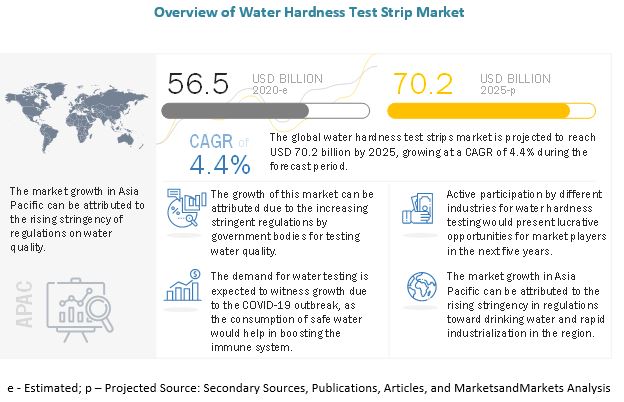The water hardness test strip market is estimated to be valued at USD 56.5 billion in 2020 and is projected to reach USD 70.2 billion by 2025, recording a CAGR of 4.4 %, in terms of value. The rise in number of industrial establishments, surge in rate of urbanization have been key factors that drive the overall value sales growth of water hardness test strip market. Asia Pacific segment is going to dominate the market, due to its high production of processed food, whereas the South American region is growing fastest owing to new technologies and increase in the export of food and beverages.
With the growing stringency of regulations pertaining to the hardness of water, the water hardness test strips market is growing at a significant rate. Municipal bodies and civic societies are usually slow acceptors of new technologies, but test strips being economical and cost-effective products for water hardness testing, are highly accepted by the civic bodies in different regions. In addition to this, stringent regulations by governments have played a major role in the adoption of water hardness test strips by civil and municipal bodies for quality testing of water.

In the past 20 years, there has been a notable increase in the allocation of government expenditures on water testing development in many countries. Organisation for Economic Co-operation and Development (OECD) listed countries spend over USD 200 billion in investments necessary to rehabilitate existing infrastructure, comply with environmental and health regulations, and maintain the required water quality and supply.
However, the growing demand from consumers for good quality water with enriched vitamins and minerals enables civil and municipal bodies to adopt the growing technology for laboratory testing of water. To meet regulatory standards, civic bodies are investing significantly to upgrade their testing technology to meet water quality norms. This, in turn, is projected to drive the growth of the water hardness test strips market across the globe.
Key players are Thermo Fisher Scientific, Inc. (US), Merck KGaA (Germany), Spectris (UK), Danaher Corporation (US), LaMotte Company (US), Johnson Test Paper Ltd (UK), Serim Research Corporation (US), Avantor, Inc. (US), Isolab Laborgerate GmbH (Switzerland), Aqua Cure Ltd. (England), Cole-Parmer Instrument Company, LLC (US), Industrial Test Systems, Inc. (US), US Water Systems, Inc (US) Bartovation LLC (US), Colorkim Kimya (Turkey), Simplex Health (UK), Amity International (UK), Instruments Direct Services Limited (UK), Hangzhou Lohand Biological Co., Ltd (China), and Changchun Wancheng Bio- Electron Co., Ltd. (China).